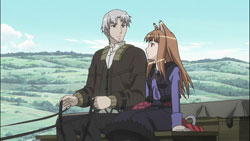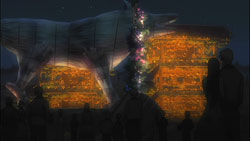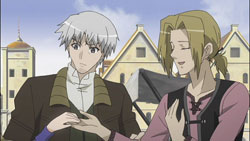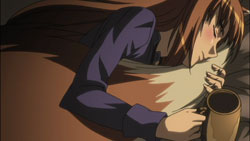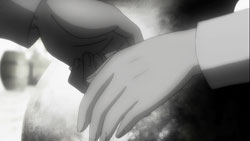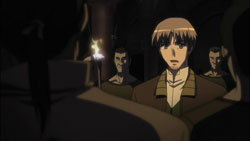 Logo handmade by Bannister
Column by Scott Green
Logo handmade by Bannister
Column by Scott Green
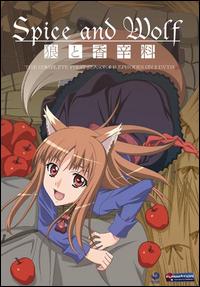
Anime Spotlight: Spice and Wolf: The Complete First Season Released by FUNimation
Merchandise can be a defining indicator of what interests an audience about a work of anime. Martian Successor Nadesico is a complex sci-fi that went in 50 directions at once, and did most of them well. Yet, as demonstrated by its merchandise, most of the attention fell on the pale, sullen young secondary character, lolicon standard bearer Ruri Hoshino. Spice and Wolf has a considerable abundance of merchandise emblazoned with images of canine eared, long tailed heroine Holo sprawled over a pile of wheat, in a field, or on some other surface. In addition to waterproof posters, a special edition release of Spice and Wolf featured animated exercise instructional short "Wacchi to Sutorecchi" (literally Stretch with Wacchi; Holo's characteristic pronoun "Wacchi" sort of rhymes with "stretch" in Japanese). Yet, Spice and Wolf also yielded a $50 replica coin. So, what sort of anime inspires enough excitement over a coin to put down that amount of change to buy it? The fourth anniverary episode of the Anime World Order podcast opened its review of Violence Hero Riki-oh by asking Manga: The Complete Guide author Jason Thompson what qualities make a specific manga title good. "Passion" "Originality" "Uniqueness" "Insanity" the sense that "Anything could happen next" were mentioned. There is a Wolf and Spice manga... one that ran in Dengeki Maoh and predates the anime, but manga is a tertiary, if that platform for Spice and Wolf... That said, those AWO comments informed what I was thinking when approaching the anime...Then, I read sociologist Malcolm Gladwell's What the Dog Saw... The book collected essays from the New Yorker about Ron Popeil (of Ronco fame), Cesar Millan, Enron, criminal profiling. Its introduction spoke to Gladwell's fascination with how people think. As Gladwell points out, when we're very young, we believe everyone thinks alike. A young child thinks that if they like goldfish crackers, everyone likes goldfish crackers. Then, we learned that people think differently. Some people can make sense of complex mathematics while others can't. There are tendencies common to how humans process the world, and, there are exceptions. What the Dog Saw draws upon the human interest in how we think and how others might think differently. The two chained themselves in my mind. Consider Luffy, the exuberant would-be pirate king hero of One Piece. The speculative cognitive workings of a kid who literally throws himself into mortal combat against a Captain Hook doppelganger who can turn into a stand storm do factor into that popular shonen title. How is the boy who little springs into action going to contest the next, seemingly insurmountable challenge? The run up is as much about anticipating his climactic breakthrough as anything else. Personal favorite Air Master features brilliant fight animation from Dragon Ball's Daisuke Nishio, but also gains credibility and audience buy-in by demonstrating how martial competition breaks its gymnast turned street fighter heroine out of a state of depression. Anime/manga excels at getting us into the mind of this sort of vital eccentric. I knew what Spice and Wolf was about prior to watching the anime. Set in one of those quasi-medieval contexts for fantasy... high or low... a travelling merchant named Craft Lawrence hooked up with a nubile harvest oriented wolf goddess named Holo (or Horo as some might still insist). I also knew that Spice and Wolf concerned Lawrence's economic dealings. Neal Stephenson's (Snow Crash) seventeenth/eighteenth historical fiction Baroque Cycle sprang to mind. Part of the point of that set of three books (Stephenson objects to the term "trilogy") was that for most, money is mystifying. We accept it the way that we accept gravity. We acknowledge the principle, but asked how it works... why the value of a dollar fluctuates versus the value of a euro , what backs the value of those currencies, how large enterprises enter into, acquire or transfer debt, most would fumble for an answer. I went into the anime knowing that and intrigued by the promise that Spice and Wolf dealt with the differences in the value of one land's coins versus the next, armor commodities, and the exchange of precious metals. As Spice and Wolf opens, Kraft Lawrence is visiting a farming community from which he periodically buys wheat. Historically, this village believed Holo the wolf spirit inhabited its fields, ensuring the harvest. During this visit, Lawrence finds the tradition to be just about dead. A strong church institution has instilled the notion that the wheat and wolf animism is an antiquated, pagan idea. At the same time, a noble has overhauled the agricultural and economic governance of growing and trading that product, replacing natural processes with more human dictated ones. The village still goes through the motions, with a local girl ritually assuming the role of Holo, but even that nod to the old thinking is on its way out. Except, in those fields, Lawrence meets a naked young girl with furry, upward pointing ears and a bushy tail, who claims she's Holo, the Wise Wolf. As Holo explains to Lawrence (repeatedly), when the fields became overtaxed, she withered the harvest, prompting them to undergo necessary fallow periods. While Holo viewed the lean years as necessary and logical, the villagers interpreted it as a sign of Holo's capriciousness. In this commerce of divinity, the locals were in a relatively hurry to cash out when a new option arrived. No longer in a hospitable environment, Holo decides its time to return to her northern homeland of Yoitsu, and that Lawrence's cart is the optimal vehicle to get there. As I saw it, the promise of Spice and Wolf was a trip into the minds of Lawrence and Holo - a guy who's head is in the world of the rules of exchange, of debt swats and recoinage - and a young-women-looking goddess ensconced in the intersection between humanity and the metaphysical. The notoriety of the former is easy to intellectualize. With financial matters invading the news headlines of the last couple years, economics have certainly proven to be a relevant domain. Though a bit more fantastic, Holo's perspective is no less intriguing. I'm not certain that Holo could be considered part of the yokai supernatural world, but she does fit into what I consider to be the draw of yokai stories. Yokai, the tengu crow mountain spirits, the shelled, dish headed kappa water imps, the shape changing foxes and so on, give a semi-human form to some fright of a dark corner, the wonder of a natural phenomenon, some metaphor or word play. In Spice and Wolf, here's a walking, thinking being who isn't human, that's a wolf, that's long lived (semi-immortal) and who sees cause-effect relationships that aren't apparent to humans. Through her, Spice and Wolf is able to embody and expression mental mechanics as they perceive the macro level. Interest in these themes was tempered by knowledge that there was little cause for enthusiasm from the people behind the Spice and Wolf anime. It was produced by Imagin, a studio whose notable work was chiefly in-between animation on series like Eureka 7 and Mushishi. Their own production work includes some eroge anime (Moonlight Lady) and some less than inspired cute girl series, specifically Cosmopolitan Prayers - about a girl working with priestess to free sun goddess Amaterasu to fix the world. Spice and Wolf director Takeo Takahashi's other directorial resume bullet pointed were Cosmopolitan Prayers and its follow-ups, Hit wo Nerae!/Smash Hit! and Love Love? His work as an animator included adult fare such as Can Can Bunny, Kisaku Spirit - The Letch Lives and Wife Eater. Spice and Wolf's script was by Naruhisa Arakawa, a writer responsible for a series of which I'm rather fond - The Legend of Black Heaven:HARD ROCK save the SPACE - heavy metal guitarist Gabriel ages into worn out office worker/husband and father Oji Tanaka, and is then recruited by a beautiful alien woman who implores him to use his music to stop hostile invaders. Arakawa also adapted Yuzo Takada's (3x3 Eyes, All Purpose Cultural Cat Girl Nuku Nuku) Shinto/plant creature horror action Blue Seed, which has its moments, but in retrospect appears to be a messy pre-Evangelion 90's action series. Arakawa has his name somewhere on the credits of a few sci-fi that I'm recommend, particularly the kitchen-sink inclusive Martian Successor Nadesico, but after that, his name tends to fall on works that warrant a "skip it" declaration, such as Steel Angel Kurumi and Elemental Gelade. And yet, I thought Spice and Wolf could probably survive the assault of a competent, if that, production staff. A significant reason for why I was prepared to take to Spice and Wolf despite the underwhelming back catalogue of the anime's creators was because it was based on a light novel. Light novels are tiny (printed in editions smaller than a manga graphic novel) prose works, generally genre, generally for teen/youngish adult audiences, and almost always, punchy, quick reads. Anime based on light novels include Baccano! (my recent model for an anime with a staff that I had little faith in, that greatly impressed me), Black Blood Brothers, Dirty Pair, Full Metal Panic, Kino's Journey, Read or Die, Slayers, and the ... of the Star (Crest, Banner, ect) series. Dating back to their earliest examples, significantly Hideyuki Kikuchi's Vampire Hunter D and Kaoru Kurimoto's Guin Saga, light novels blended that rapid paced writing with development of a place and its spirit. Set in the year 12,090 AD, after a nuclear holocaust nearly wiped out humanity back in 1999, and after a reign of vampire lords took hold, then began to decay over the centuries, Kikuchi related the nature of the Gothic/Western world, from his hero's cape/duster and robot horse, to the workings of half functioning technology, to the hinge that was no longer maintained. From the Swiftian societies visited during Kino's Journey to the demon lord cosmology of Slayers, anime has proven able to capitalize on the detailed backgrounds offered by light novels. In fact, some adaptations, such as Black Blood Bothers, seem to do little but introduce and explore those worlds. A substantial part of the appeal of anime is supposed to be that it explores ideas not explored elsewhere, and expresses then in manners not expressed elsewhere. Economics via the wanderings of a feudal European peddler and a wolf harvest goddess seems like a recipe for capitalizing on the winning qualities of anime. Instead, the impression of Spice and Wolf that I had watching the first episode is the one that the series maintained through its first, 13 episode series. Spice and Wolf is as anime it is, not anime as it could/perhaps should be. I'm glad I saw it. I wasn't entirely disappointed. However, I'm in no hurry to check out the light novels, released in North American by Yen Press, or the second season of the anime. It is defined by its leads, one of which defines himself as a merchant. And, it is structured by his mercantile dealings. To its credit, those negotiations never get too didactic, but they are neither too not quaint nor too infantile either. Yet, there is less here than I desired. Spice and Wolf does not appear to be conceived in such a way as to please someone who went into the series with my expectations. While the anime production did not rise above my prejudice, I'm not convinced that it was at fault. As much as I wanted Spice and Wolf to be anime in the heads of characters who thought differently, I found it to be populated by ones who readily map to familiar types. Holo's nakedness, her hears, the attraction to the magnetic pull of food and alcohol... her characteristics were the hallmarks of id driven characters and exotic girlfriends seen in anime for decades: Urusei Yatsura's Lum, Tenchi Muyo's Ryoko, Love Hina's Kitsune and their descendants. She is the "Wise Wolf" and her wisdom in regards to truths does complement and contrast with Lawrence's knowledge of coins, trade organization hierarchies and contacts. They're an odd couple. Worldly guy whose decisions often land the pair in trouble, and insolated girl whose insight often guides the path out. He's the one to raise a deal and spell out its implications. She's the one to detect and question why a person would lie. Good, regular guy and divine/powerful girl is a much done dynamic in anime, but Spice and Wolf leans its appeal on that pillar. It does introduce something deep and distinctive in this relationship. Holo is a wolf goddess and Lawrence has had some encounters in which he was the would-be prey of the wild creatures. As such, his reaction to Holo sometimes drifts into discomfort, trauma and even abject fear. For her part, Holo has developed a complex relationship with humanity; not so much dependant in a goddess must be worshiped to exist sense, but a personal need not to be lonely. Except, Spice and Wolf is short on provocative moments and long on mannerisms. Holo hugs onto her tail as she sleeps. She and Lawrence tease and bicker, not so much like a married couple as one who have been courting each other for a long while. The distinctive trappings of Spice and Wolf prove to be covering over a set if gears churning through plenty of anime/manga/light novels. The proposition that Spice and Wolf presents does not rely on whether you're inclined to be convinced to be interested in economics. It does rely on the extent to which you fall for Holo and her relationship with Lawrence. Spice and Wolf is summed up by one of those black bordered motivational poster meme images floating around the net... Lawrence has grey-ish hair, he's scruffy, he has faded scars. He should be, and to some extent is, a voice of entrenched professional experience. And yet, his dreamer's demeanor with notes of being the put-upon guy places him into the role of point of view males found throughout anime, manga and related media. In explaining the workings of various deals to Holo, Lawrence does make the audience privy to merchant-think, but in a way that is limited by Lawrence's limitations. He's not someone who engages business with a high degree of sophistication. His plans are broadly strategic and only loosely tactical. Acquire something here, sell it there, relying on reactions and his own wit with little "if X then Y planning". There's an implicit expectation that not everyone is honest, but that dishonesty occurs in predictable ways, and that institutions should behave with similar predictability. That doesn't happen, and as a consequence, Lawrence finds himself in adverse situations. The upsetting of Lawrence's expectations is a subject that Spice and Wolf could have plumbed. It could be the wedge point for a mature, seinen style reconciliation of a guy's aspirations with the realities of the path his life would take. Instead, the conspiracies, ploys and bad luck that carry Lawrence and Holo along are part of the plot mechanics. If the major characters are servicing the plot, you can bet the minor ones are too. There's a young woman shepherd who shows her mettle protecting sheep from wolves, and Spice and Wolf tells us that her earnestness overlays a determination to get what she wants, even if it means crossing some lines. Like Holo, she's as much an aesthetic object as she is a character... the bucolic, blonde haired, wool clad girl who might as well be on a beer bottle. The cross the line bit of her character manifests in helping L and H in one of their endeavors. As valid as the behavior is for the character, it's her fulfilling a prescribed pattern. There isn't much that it really says about her way of thinking or how that way of thinking exchanges with the peddler and the wolf deity's. Spice and Wolf has an enthusiastic following, so it is evident that fuzzy Holo bickering with put upon Lawrence does find a welcoming audience. If that is the chief appeal of the series, it's in the company of numerous other anime doing the same thing. Maybe it does deserve some credit for its "come for the girl, stay for the economics" quality, and maybe you'll be saying "wow, that's surprisingly smart anime." Personally, I'm a fan of narratives about systems. The Color of Magic, Terry Pratchett's early Disk World satire of economics was a favorite entry in that fantasy/British humor series. I invested enough in Stephenson's above mentioned story of debt swaps, commodities and exchange transactions to stick with it through the course of 2,500 some odd pages. For Spice and Wolf... I'll repeat... I wasn't entirely disappointed. I was disinclined to invest in the Holo/Lawrence relationship or fall for her endearing physical ticks. As such, my enjoyment of the series fell to whether I found the mindset of these principals to be credible, well developed and distinctive. In each respect, the quality is there, in a small measure. If you're a fan of anime of Spice and Wolf's type with little interest in economics, it will convince you to pay attention. If you're interested in the functions of money and the like, with little interest in anime, it's unlikely to win over your attention or affection.

